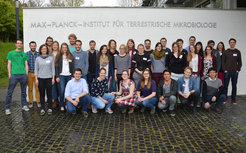PhD students meet to share marvelous & terrific microbiology
The “It MaTer(s)” meeting was organized by the PhD representatives in Bremen and Marburg. At the meeting, the PhD students introduced research and graduate programs at their institutes in talks. Moreover, the Bremen students had the opportunity to participate in a guided tour through all the departments and laboratories to capture the whole research landscape and facilities. The Bremen students also enjoyed a bit of sightseeing in Marburg and spending some time in the historical old town.

In several sessions, selected PhD students presented their research, ranging from marine ecosystems, cell surface structures, the marine nitrogen cycle to cell division mechanisms, synthetic CO2 fixation and plant pathogen interactions. Rafael Laso-Pérez from Bremen introduced his work on anaerobic degradation of propane and butane in mixed marine archaea/bacterial consortia. The research on cell surface structures and appendages in the pelagic Flavobacterium formosa was presented by Tanja Fischer from Bremen. Clara Martínez-Pérez talked about microbial communities and their impact in the marine nitrogen cycle. From Marburg, Sabrina Huneke-Vogt presented her work on inhibition of cell division during development of Myxococcus xanthus, which guarantees the formation of diploid myxospores. How light driven linear electron flow in Chlamydomonas reinhardtii can be linked to synthetic carbon fixation pathways was introduced by Tarryn Miller. Finally, the talk sessions were closed with Mariana Schuster’s talk on CRISPR-Cas9 as a tool for the study of effector gene families in the plant pathogenic fungus Ustilago maydis. Two poster sessions with contributions from all departments and research groups completed the two-day gathering. Many scientific discussions and potential future collaborations arose during the lively interactions.
Altogether the meeting was a great success and it is planned to repeat it in 2018 in Bremen.












